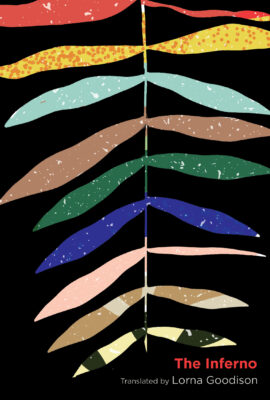“Halfway tree. The journey of our life found me
there at midnight in a ramshackle state,
for to tell you the truth my feet had strayed.”
So begins a new translation of The Inferno, the first of the three works comprising Dante’s The Divine Comedy, by the Jamaican-Canadian poet Lorna Goodison. This opening stanza resets the epic poem in a new register – namely, Jamaican vernacular English – and establishes a striking tone. The speaker finds herself at the “halfway tree,” a “Bitter! Barren!” place, and surveys the landscape behind her with the humbled gaze of a survivor: “I turned back to study with awe / the dark pass none before me did ever leave alive.”
The Inferno Véhicule Press
Dante Alighieri
Translated by Lorna Goodison
$24.95
paper
250pp
9781550656787
As in Dante’s Inferno, the speaker’s midlife malaise catalyzes a tour of the underworld, where those who’ve sinned pay penance for their earthly wrongdoings. Whereas Dante was led by the Roman poet Virgil, Goodison’s speaker follows Miss Lou, the nickname for Jamaican-Canadian poet and folklorist Louise Bennett-Coverley. In Canto II, the speaker cites Miss Lou’s tales of twentieth-century Black nationalist Marcus Garvey and eighteenth-century resistance leader Nanny of the Maroons. In Canto IV, where Dante encounters the poets Homer, Horace, Ovid, and Lucan in Limbo (as they are non-Christians), Goodison places Philip Sherlock, Dennis Scott, Anthony McNeill, and Kamau Brathwaite. Goodison’s nods to these Caribbean greats affirm that The Divine Comedy is not just a canonical work – it explores canonicity itself, and how figures and stories from the past shape the ground of meaning for our relations in the present. As the speaker wonders near the beginning, “But why is me must go?/ Who says so? I am not Garvey, Nanny nor Marley.” Miss Lou counters: “is like yu soul downpress by cowardice… / You must get release from fear.”
Goodison maintains the tercets that structure the original Inferno across its thirty-four cantos and reproduces Dante’s nine-circle structure of Hell. Whereas The Divine Comedy was written using an interlocking terza rima rhyme scheme, Goodison writes in free verse, finding rhyme only when it comes naturally in her poetics. Still, Goodison’s lines bristle with colloquialisms and music. I was particularly struck by her work with Canto V, where she transforms Dante’s Francesca and Paolo – blown by the winds of desire as punishment for submitting their reason to lust – into “scholars of popular culture / like Dancehall and Rap.” This canto demonstrates both the faithful study and surprising dislocations of Goodison’s interpretation. To read it solely for homology with Dante’s allusions would miss something of this text’s unique character. From her own dark wood, she calls – as Walter Benjamin described the translator’s task – into the “middle of the high forest of the language itself.”
As a reader of Dante, I hope to follow Goodison’s speaker through Purgatorio and Paradiso, too. For now, however, this is a fascinating work: one that would appeal to those interested in Dante, the Caribbean, world literature, or translation, or simply those seeking to face the dread rising from the ground of the everyday.mRb






0 Comments